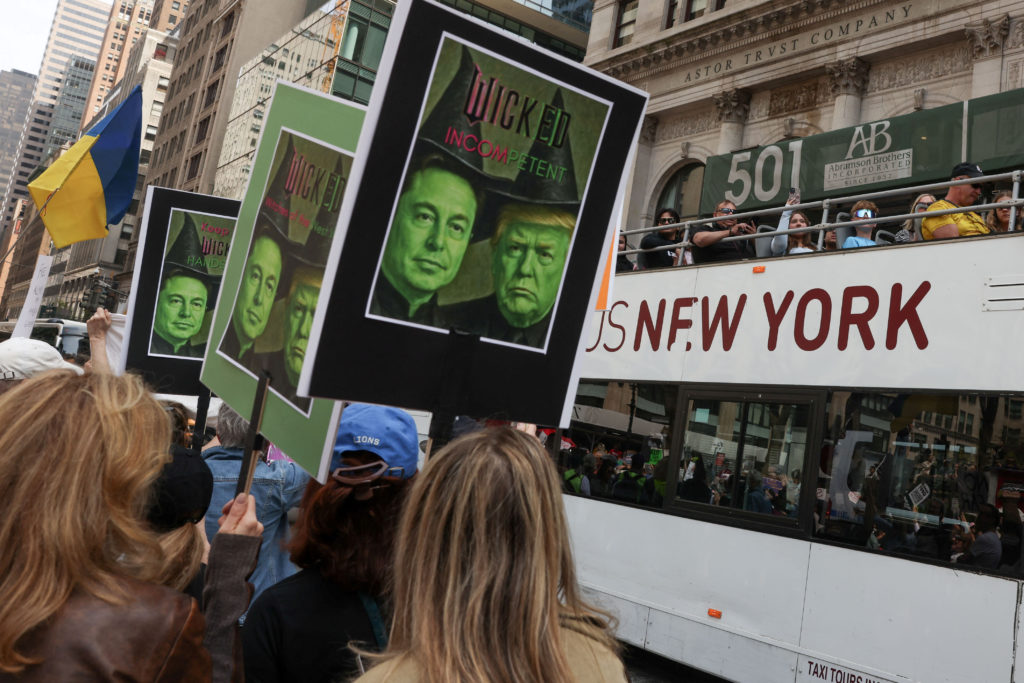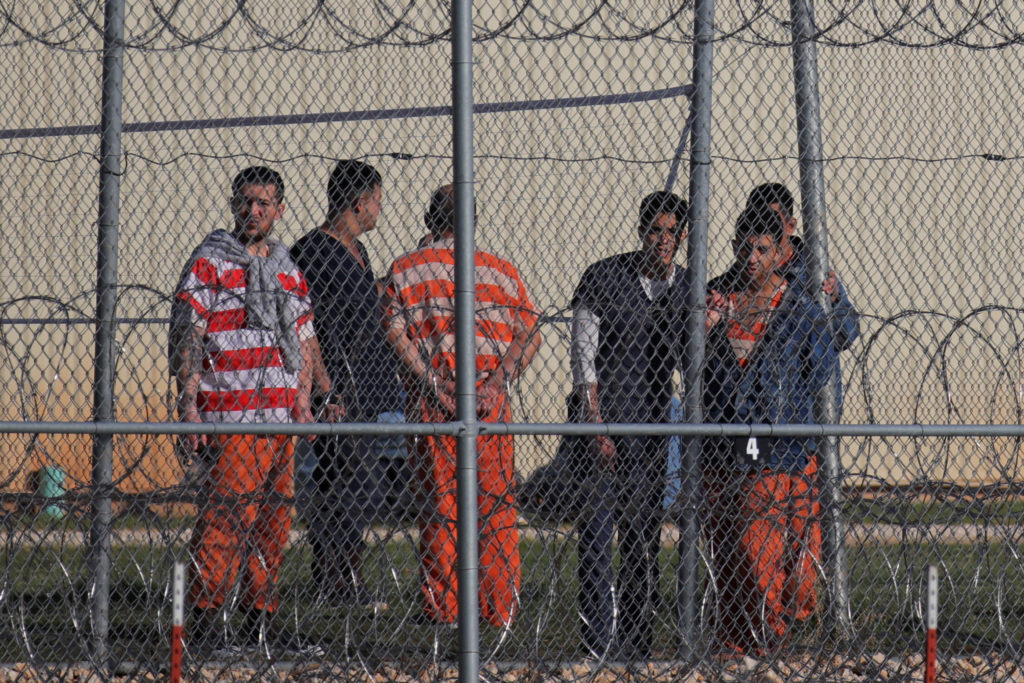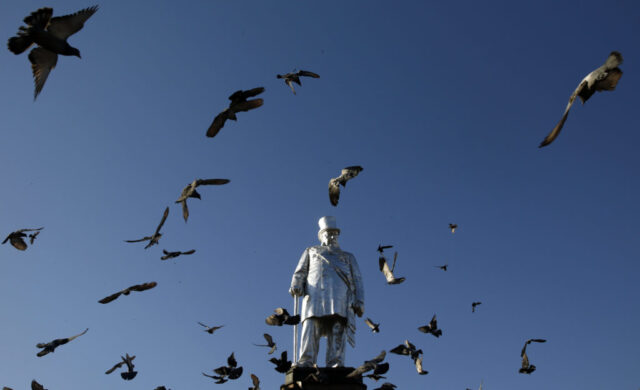
One of President Donald Trump’s first actions of his new term was to halt the arrival of all refugees coming into the United States. Yet there’s one group he’s made a point of welcoming: the white South Africans known as Afrikaners.
“Any Farmer (with family!) from South Africa, seeking to flee that country for reasons of safety, will be invited into the United States of America with a rapid pathway to Citizenship. This process will begin immediately!” Trump wrote on his Truth Social account last month.
WATCH: The historical reality of land ownership in South Africa amid Trump’s criticisms
His social media post was only the latest invitation to the Afrikaners, descendants of Dutch and French settlers. Trump signed an executive order in February encouraging their resettlement in the United States. As justification, he cited a South African law on land expropriation and affirmative action that he claimed discriminated against Afrikaners, as well as that country bringing a genocide case against Israel at the International Court of Justice.
At the same time, the president has ended funding for refugee resettlement programs and declared that refugees competed for “resources” against Americans. About 600,000 people were being considered for admission when Trump suspended the program right after his inauguration. Some refugees had already been approved following a yearslong process and had scheduled flights.
“The idea that there were refugees who had been identified, vetted, who had spent years as refugees, and their hopes for admission to the United States after years of suffering had been crushed, that now the one exception would be made for Afrikaners just seems like a cruel twist to those refugees to whom the door was closed in their face,” said Bill Frelick, director of Human Rights Watch’s Refugee and Migrant Rights program.
In late March, an appeals court ruled that refugees who were conditionally approved before Trump’s executive order must be let in, but that his administration can stop approving entry for new refugees. That decision narrowed a judge’s February ruling that said the government needed to reinstate refugee resettlement services.

Detainees stand behind a fence at the Bluebonnet Detention Facility, where Venezuelans at the center of a Supreme Court ruling on deportation are held, in Anson, Texas, U.S. April 22, 2025. Photo by REUTERS/Daniel Cole
It’s unclear how many Afrikaners are interested in obtaining refugee status. The U.S. Embassy in South Africa said in March it had received a list of more than 67,000 people who had expressed interest in refugee resettlement in the U.S. The New York Times has reported that the Trump administration has created a program to facilitate the migration of Afrikaners to the U.S. and has 8,200 people who have expressed interest in seeking refugee status. It has already identified 100 people whom it could approve.
Following Trump’s announcement, many Afrikaner organizations that have been critical of the South African government distanced themselves from the U.S. offer.
A handful of white South Africans have sought refugee status in other countries in the past few decades. In 2009, a white South African was granted refugee status in Canada, saying he feared violence and discrimination against him as a member of the white minority. His status was later overturned by a Canadian federal court. In 2014, another white family was granted refugee status in Canada based on the threat of gender-based or racial violence in South Africa.
Frelick said that according to UNHCR numbers, no one from South Africa, regardless of race, had applied for refugee status in the previous year, though he added that someone could have applied outside the UNHCR process.
“This is not something that I even recognize as a refugee situation.” Frelick said.
Why is Trump singling out South Africa?
Trump’s executive order was not the first time South Africa had drawn the president’s attention. In 2018, Trump tweeted that he was asking his administration to investigate the “large scale” killing of white farmers in South Africa and falsely claimed that the government was seizing their farms. The president tagged Fox News and former host Tucker Carlson in his post. Earlier that evening, Carlson had said that the Black-led government had passed legislation allowing land to be confiscated on the basis of race and criticized Trump’s State Department for inaction.
While Afrikaner rights groups have criticized their government and argued that white South Africans are being victimized, Frelick said that Afrikaners are some of the most economically advantaged people in the country.
“The idea that this would be the one group that you would single out, not just in South Africa but in the entire world, it’s just mind-blowing, really,” he said.
Formal apartheid ended 30 years ago, yet white South Africans still dominate the country’s economy. White South Africans make up about 7 percent of the population but hold more than 60 percent of the top corporate management jobs. Black South Africans, who represent more than 80 percent of the population, fill only about 17 percent of those jobs. Black South Africans are also almost five times as likely to be unemployed as their white counterparts.
Land ownership is similarly starkly racialized. White South Africans own three-quarters of all privately held land in South Africa. Only 4 percent is held by Black South Africans.
Since South Africa’s first democratic elections in 1994, the government has taken steps to rectify the effects of apartheid, including using affirmative action, requiring companies to diversify their shareholders and land reform. These efforts have been met with criticism by many white South Africans and figures on the American right, including Trump. The president’s circle includes affluent – and influential – South Africans, including Elon Musk and his cryptocurrency czar David Sacks.
“The perception is that any policies that are being applied by the [South African] state government to promote redress is itself racist, as some form of reverse apartheid,” said Ryan Cummings, a consultant on migration and conflict and the director of Signal Risk, an Africa-based risk management company.
In the U.S., the Trump administration has worked to strip and dismantle diversity, equity and inclusion initiatives from all corners of government and many aspects of public life.

Tourists pass in a bus as people rally to “Protect Migrants, Protect the Planet” in New York City, U.S., April 19, 2025. Photo by REUTERS/Caitlin Ochs
His offer of resettlement to Afrikaners is a stark contrast to his stance on other immigrant and refugee groups. In 2016, Trump said that Syrian refugees could be a “trojan horse” for terror attacks. In 2018 during his first presidential term, Trump used profanity to complain about immigrants from Haiti, El Salvador or Africa rather rather than wealthy, white countries such as Norway. During last year’s presidential campaign, Trump re-upped his desire for European immigrants, asking why more people from “nice countries” like Denmark did not immigrate to the U.S.
What’s unique about Trump’s approach?
Historically, the White House plays a direct role in setting refugee and asylum policy, using it at times as a tool for geopolitical goals.
“It certainly has been a characteristic of U.S. foreign policy,” Frelick said.
After the 1956 Hungarian revolution was crushed by the Soviet Union – a U.S. foe during the Cold War – President Dwight Eisenhower declared that 5,000 refugee quota spots would be reserved for Hungarians. The White House helped more than 30,000 Hungarian refugees migrate to the U.S. over the next two years. Later presidents would intervene to assist Cuban refugees after Fidel Castro took power; the Refuseniks, Jews who had not been permitted to emigrate from the Soviet Union; and Vietnamese refugees after the fall of the U.S.- allied South Vietnam.
Frelick said “the genesis” of modern refugee policy in the U.S. can be traced to the Vietnam War, when the U.S. joined the South Vietnamese government in fighting the communist North. After the U.S. withdrew from the country and South Vietnam fell, thousands of former allies were at risk of retribution.
This history explains why the U.S. takes in refugees who are of “special humanitarian concern to the United States,” Frelick said. “The U.S. isn’t going to take all the refugees from the world, but it’s going to find people who … the U.S. is concerned about.”
But while U.S. presidents have used refugee policy to pursue global interests in the past, Frelick described Trump’s executive order as “extreme” because it called out both South Africa’s domestic policies on land reform and its formal accusation of genocide against Israel.
“Combining those two things indicates that this is less of a humanitarian concern for the Afrikaners. It’s more a way of weaponizing criticism of South Africa, as well as South African policies.”
In Trump’s actions, Dan Magaziner, professor of history at Yale University, sees a broader discomfort with democracy itself, “not because democracy succeeded apartheid, but because democracy succeeded colonialism.”
“I think what’s very striking about Trump’s approach to things, and I think this is very much Musk’s approach to things as well, is it’s old-school, 19th century imperialism. ‘We are the strongest. We are the best. We should be able to do whatever” we want, Magaziner said, using an expletive.
Cummings said that South Africa’s “cozying” up to China and its participation in BRICS, a 10-country international organization that includes Russia, India and Brazil, has also run up against U.S. interests.
“The Trump administration sees that as somewhat of a threat to U.S. hegemony,” Cummings said.
“The [U.S.] government is basically saying to any potential antagonist, ‘We’re not afraid to come at you and target you by name,’” and is using refugee policy to do that, Magaziner said.
Insightful, trustworthy journalism, for everyone.
Your tax-deductible donation ensures our vital reporting continues to thrive. Support PBS News Hour now.

















































